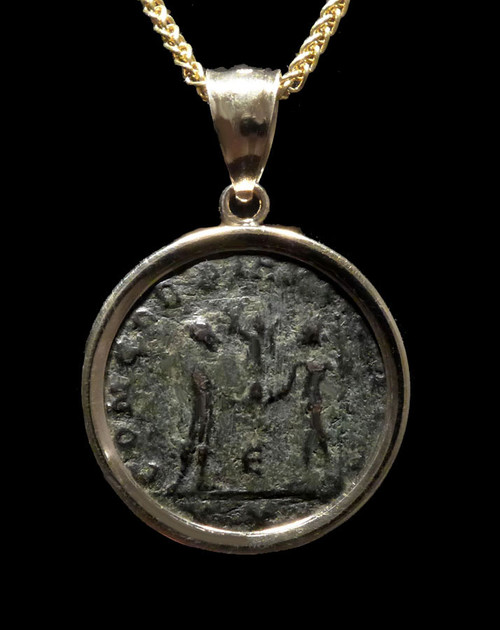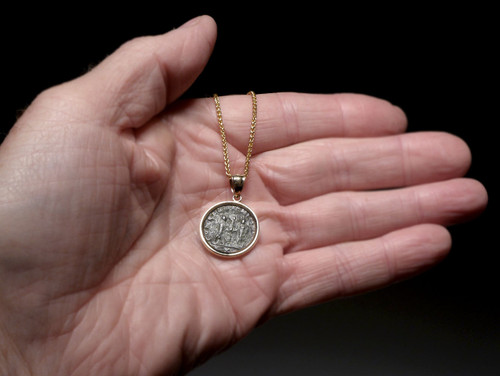Product Description
This ancient Roman bronze coin was minted between 305 - 311 AD during the rule of emperor Gaius Galerius Valerius Maximianus. It is set with the reverse side showing a detailed image of the god Genio, holding a patera over an altar and a cornucopia. Encircling is the inscription"Genio Exercitus" meaning, "Guardian Protector of the Military". The Roman god Genio was similar to a guardian angel spirit and everyone was believed to be accompanied by this attendant spirit in the course of their life. This coin is set in a high polished 14K yellow gold smooth pendant setting in a unisex design making this pendant equally fitting for wear by either a man or woman.
The coin features superb detail and high relief of the side show, as well as a beautiful dark chocolate patina. This is a perfect piece for any military enlistee or veteran, as well as the husband or wife or parent of a member of the military. From a time when the military of Rome personified honor, serving as the ultimate protector of the order of one of history's greatest societies.
*** Chain is not included but may be purchased additionally, at the link below
SETTING: 14KT YELLOW GOLD
COIN: BRONZE FOLLIS
COIN AGE: 305 - 311 A.D.
DIMENSIONS: .80" or 21 mm overall diameter
:::: Includes Gift Box
:::: Includes CERTIFICATE OF AUTHENTICITY / HISTORY SHEET
ADD THE DISPLAYED GOLD MEDIUM WHEAT CHAIN
MORE ANCIENT ROMAN COIN JEWELRY
HISTORY
Gaius Galerius Valerius Maximianus served with distinction as a soldier under Emperors Aurelian and Probus, and in 293 AD at the establishment of the Tetrarchy, was designated Caesar along with Constantius Chlorus. He ruled as Roman emperor from 305 to 311. During his reign, he campaigned with Diocletian, against the Sasanian Empire, sacking their capital Ctesiphon in 299. He also campaigned across the Danube against the Carpi, defeating them in 297 and 300. Although he was a staunch opponent of Christianity, Galerius ended the Diocletianic Persecution when he issued an Edict of Toleration in Serdica in 311.
Christians had lived pleasantly during most of the rule of Diocletian. The persecutions that began with an edict of 24 February 303, were credited by Christians to Galerius' work, as he was a fierce advocate of the old ways and old gods. Christian houses of assembly were destroyed, for fear of sedition in secret gatherings.
It was at the insistence of Galerius that the last edicts of persecution against the Christians were published, beginning in 303, and this policy of repression was maintained by him until the appearance of the general edict of toleration, issued from Nicomedia in April 311, apparently during his last bout of illness (see Edict of Toleration by Galerius). Galerius's last request was that Christians should pray for him as he suffered with a painful and fatal illness.
Initially one of the leading figures in the persecutions, Galerius later admitted that the policy of trying to eradicate Christianity had failed, saying: "wherefore, for this our indulgence, they ought to pray to their God for our safety, for that of the republic, and for their own, that the republic may continue uninjured on every side, and that they may be able to live securely in their homes." This marked the end of official persecution of Christians. Christianity was officially legalized in the Roman Empire two years later in 313 by Constantine and Licinius in the Edict of Milan.
 US Dollars
US Dollars
 AUD
AUD
 CAD
CAD
 POUNDS STERLING
POUNDS STERLING










